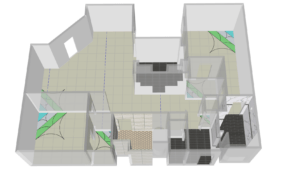 Technology is an invaluable—and often underestimated—asset to the flooring industry. Use of technology, and flooring-specific software in particular, benefits nearly all aspects of a flooring retailer’s business, including inventory management, estimation, pricing, sampling and much more.
Technology is an invaluable—and often underestimated—asset to the flooring industry. Use of technology, and flooring-specific software in particular, benefits nearly all aspects of a flooring retailer’s business, including inventory management, estimation, pricing, sampling and much more.
What’s more, as flooring software continues to evolve, it has become increasingly more effective and helpful to each retail business forward-thinking enough to utilize it. So, what can retailers gain from this technology? Which is the best software to use? How exactly will you benefit from a flooring-specific software system? We’ve talked to several flooring software providers to find out.
Advantages of the right kind
First and foremost, it’s all about keeping it flooring specific. “In flooring, there’s a lot of nuances—a lot of different ways of doing business,” explained Todd Saunders, CEO of Broadlume. “Because we only work in flooring, Broadlume has seen every edge case of a retailer. The retailers that shop at home, the retailer that does a little bit online, a little bit in store, the retailer that does refinishing but only on Wednesdays. The retailer that does hardwood only but carpet binding. As we’ve seen all those different variations, we have features and functionality for every single type of retailer. Whereas if you use a non-flooring software, you’re just trying to fit a square peg into a round hole. And if you are even slightly different than just a bread-and-butter flooring retailer, now you’re fitting a triangle into a round hole. It’s nearly impossible.”
So, what’s possible with the right flooring-specific software? Simple: efficiency. “This is due to time-saving automation, better collaboration between employees, information being right at your fingertips, mistakes being red-flagged and even the simplicity of being able to select the right units of measurement for flooring,” explained Chad Ogden, CEO of QFloors. “Being able to electronically transfer price lists, product catalogs, POs and more, right from the supplier, is usually game-changing for dealers.”
Next, think about the ways you can enhance the effectiveness of your interactions. “In terms of customer engagement, retailers need cost-effective, measurable ways to generate leads through digital advertising solutions, including social media management, SEO and paid search,” said Rod Bayless, general manager of Cyncly Flooring Solutions. “They need digital marketing through a great website and e-commerce tools. And they need industry-specific CRM solutions to understand each customer to build a relationship based on outstanding service.”
To get more specific, estimation is often a difficult task for retailers—but it doesn’t have to be with the right software. “[The benefits are] the ease of use for all estimators on a site or with a potential customer, the saving of time when close to deadlines and the professionally finished projects for presentation and rendering of examples for clients and customers,” explained Keelyn Young, marketing manager, Measure Square. “Flooring retailers must provide a solution in real-time for customers or they could potentially lose them to a competitor. Flooring-specific software gives them an advantage in delivering uncomplicated estimations within days or even minutes, depending on the project.”
 What to look for
What to look for
With those benefits in mind, it’s important to understand not only what you want in a flooring-specific software but what is provided by those you’re considering and how they plan to get you there.
“Two of the biggest things to look for—which someone might not immediately think of—are ease of use and customer support,” QFloor’s Ogden explained. “Because the most robust, technologically sophisticated system in the world cannot help you if you can’t use it. And it can’t help your business if your employees can’t learn to use it. While there will always be a learning curve with any type of software system, you should evaluate the following: how complicated is it? What kind of tech support will you have while coming up to speed? What resources are available? Are there live people you can talk with or simply a chat bot or email? Do you have to pay extra to access help? How much?”
Measure Square’s Young agreed. “When implementing a new software, usability should be top of mind. Complex systems bottleneck your operation and can be a challenging learning curve for your team members. While ‘set it and forget it’ software exists, there is still a level of education and training that needs to take place to ensure the new software runs accurately. You want easy-to-use and easy-to-learn software from a company that provides quality onboarding, training and resources at your disposal.”
Another two major touchpoints are scalability and trust, according to Broadlume’s Saunders. “The biggest thing to look for is not where you are today, but where you want to be. You spend all this time, money and energy getting into this brand-new back-end software, but does it scale? Is that software company going to be in business 10 years from now? Do they have any customers that do the same amount of business as you—or what you want to be doing: $100M or just $1M? The second thing is, it’s such a time and money commitment, that you must trust that company. You’re getting in bed with someone, and you have to believe that company is going to innovate and take you where you want to go.”
Cyncly’s Bayless agreed, noting the importance of getting what you want today but preparing for the future by asking yourself—and your software company—the hard questions. “Does it cover your full business needs today? In other words, are you getting a complete solution for marketing, estimation, sales, inventory, payroll and accounting? Can you get the insights you need to identify and act on processes that need improvement? If not, how difficult will it be for you to integrate different pieces of software for a total digital process? And then, does it prepare you for the future? Is your provider innovating and offering new technologies? Are they offering cloud software that minimizes the amount of IT support and maintenance your team needs to handle?”
There are many different elements to consider when choosing the right software solutions. Some may be more suitable for your business than others, and most are constantly updating and changing. However, asking the right questions and choosing wisely will only help propel your business forward, experts said.

